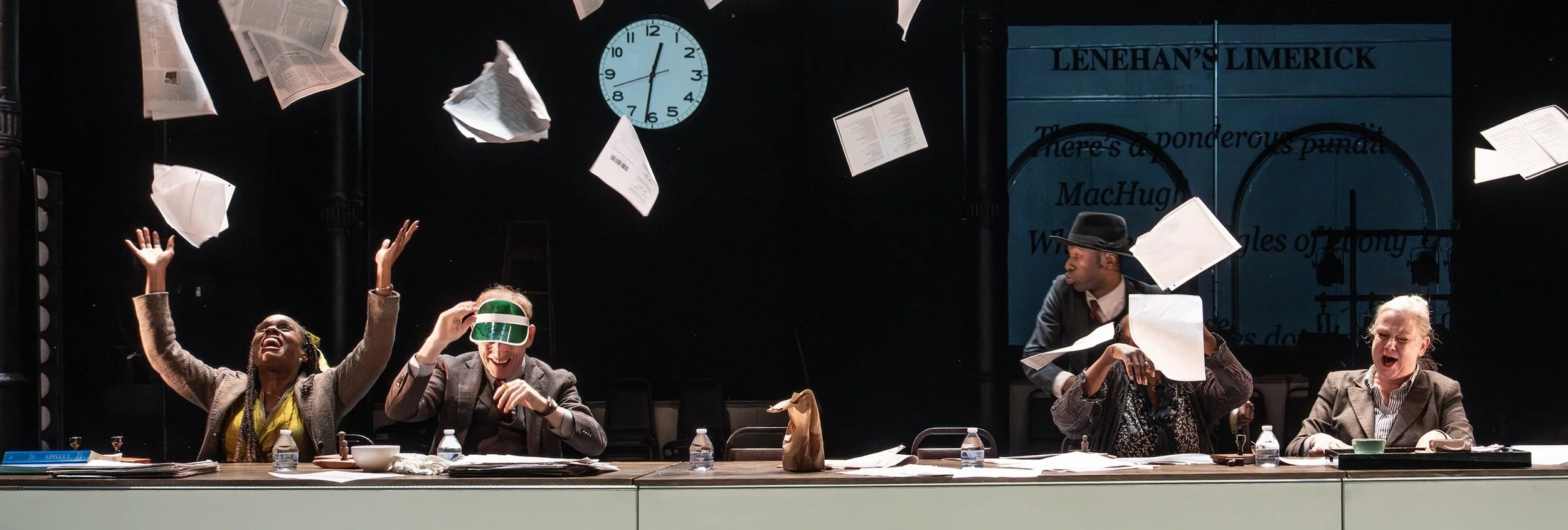When it first appeared in 1947, Allegro was clearly a departure from Rodgers and Hammerstein’s earlier shows, Oklahoma! (1943) and Carousel (1945). Influenced by Thornton Wilder’s classic, Our Town (1938), Rodgers and Hammerstein intended it to be staged experimentally—without scenery and employing a Greek chorus. (Stephen Sondheim, a protégé of Hammerstein, was a gofer on Allegro, and he has attributed his willingness to experiment in his own works to the experience he had on his mentor’s show.) The simple plot—the life of a doctor from birth to age 35—seemed appropriate for a pared-down approach. But the musical flopped.
Still, Allegro is one of those fascinating footnotes that one hopes deserves another chance with the right director. John Doyle, who is at the helm of the current revival at the Classic Stage Company, employs his signature style for it—performers also play the instruments. That fits in nicely with a production that still has the choral commentary and still feels unsettlingly weird coming from the team known for their intensely romantic stories—their next show was South Pacific (1949). Doyle also cuts the show to 90 minutes with no intermission, and it helps.
The show’s major drawbacks remain, however. One is its cinematic quality: it’s a series of snapshots in the life of its hero, Joseph Taylor Jr. It begins with the grown, dressed Claybourne Elder as the infant Joe Jr. sitting next to his mother (Jessica Tyler Wright) with his head on her lap, Pietà-like. Elder manages to capture the innocence of a newborn in the lovely scene. As the book jump-cuts to further episodes in Joe’s life, the chorus comments: Joe learns to walk (in the terrific song “One Foot, Other Foot”), loses his Grandma (an affecting Alma Cuervo) and makes friends in school, notably Jenny Brinker (Elizabeth A. Davis). She is his first love, and eventually she becomes his wife, but Jenny’s father is rich, and he wants her to marry someone with a moneyed future. Though Joe idolizes Joe Sr. (Malcolm Gets) and his small-town, hands-on practice, Jenny steers Joe toward wealthy patients and the big city (Chicago).
That is the second problem. Elder, good as he is, can’t bring excitement to the meek Joe, who never really seems his own man—he’s manipulated by Jenny and others. As his loyal nurse, Emily (Jane Pfitsch), sings in the show’s best-known song, “The Gentleman Is a Dope.”
When Allegro opened, some critics read it as an attack on the wealthy. Hammerstein, who had also written the book, complained that it was being misunderstood, that it was instead a critique of the distractions of big-city life. But a show with a song titled “Money Isn’t Everything” inevitably lacks nuance. Stephen Sondheim, in his book Finishing the Hat, is savvy about the shortcomings of some of his mentor’s lyrics—notably the redundancy in the title song: “Brisk, lively, merry and bright/Allegro.” (That Hammerstein tendency to hammer away is more obvious in another song, “Ya-ta-ta”: “Broccoli, hogwash, balderdash/Phoney baloney, tripe and trash!”)
Near the end, when Joe protests his boss’s dismissal of a lifelong nurse because she has supported union activism in the hospital, the boss (Randy Redd) pays him no mind: “Ah, my boy, but there’s such a thing as discipline—loyalty! We must do many things we don’t want to do. Duty—we must be good soldiers!” It's an obvious echo of the just-concluded Nuremberg trials, where defendants had used the same excuse for their participation in torture, medical experiments, and mass murder. The blunt-force irony comes off as preachy even now, and it must have registered even more forcefully then. The didacticism of Hammerstein’s book also recalls that of Brecht, and Jane Cox’s lighting draws on German Expressionism with its harshness. Twice the lights go up on the audience for the performers to harangue us.
Still, CSC is to be commended for giving this thorny work another look. Rodgers’s music is lovely, and the actors do a fine job playing their instruments and injecting energy into the show. Doyle has paced it well, and it’s not boring. It’s like catching up with an old friend who’s just passing through—the visit may be pleasant, but the next one can wait awhile.
Evening performances for Rodgers and Hammerstein’s Allegro are Tuesdays through Thursdays at 7 p.m., and Fridays and Saturdays at 8 p.m. Matinees are Saturdays and Sundays at 3 p.m. The musical runs through Dec. 14. Tickets start at $70 and are available at www.classicstage.org or by calling 212-352-3101 or 866-811-4111, or at the box office at 136 East 13th St. (between Third and Fourth Aves.).








